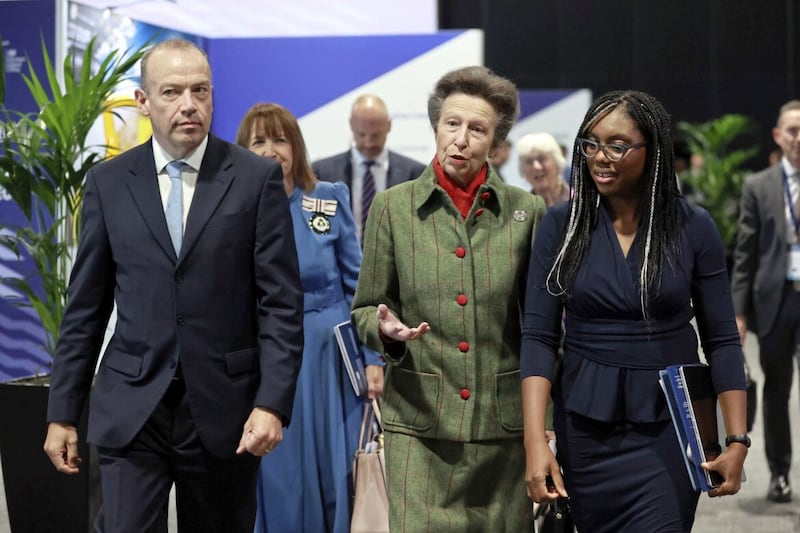IT'S probably an understatement to say that companies across Northern Ireland were apprehensive about the first week of January 2021. They have faced unprecedented challenges in recent months getting ready for our new relationship with the European Union, while all the time coping with mounting Covid pressures. Industry leaders have been working around the clock.
But it appears that last week, although a bit bumpy, was not as chaotic as some of us might have envisaged. That said, low traffic volumes (probably down 40 per cent from normal) and forward planning by chief executives who had built up their inventory levels, have worked to reduce chaotic scenes in the first few days of the year.
The primary issue between GB and Northern Ireland suppliers has been GB-based companies not understanding the paperwork that they have to do. The UK government has acknowledged that it is their responsibility to get GB companies up to speed with the new requirements and they will endeavour to rectify the situation as soon as possible.
However, companies do still warn that ports such as Felixstowe, which had significant problems before Christmas, have not resolved all their issues. Indeed, NI exporters are finding that they are encountering problems at global ports too because of Covid-19 issues, for example, Asian routes are disrupted and spices are proving difficult to source.
Ferry companies are doing their best to keep the GB-NI cargo routes open by sending back empty containers for now – but this is costly and not sustainable and will probably require subsidies from government in the next three months while these problems get ironed out.
Companies tell the CBI that they had expected quarter one of this year to be bumpy, but they are hoping for improvement and smoother trading in quarter two. There is clearly a piece of work to be done in terms of making the NI Protocol work smoothly in the weeks and months ahead; and it will take innovative solutions and good collaboration between industry and government to ensure trade flows as it should between Northern Ireland, Britain and the EU.
The CBI has called for a formal engagement process to be set up between the UK and EU, and business representatives, so that pressing issues can be raised immediately, and solutions discussed. We hope to see that engagement process begin this month.
Of course, all this friction is set in a backdrop of Covid. When we consulted with members on this issue last week, we found that local absenteeism levels have shot up significantly for most firms. But despite the alarming rate of infection, firms reported that their absenteeism levels are being been driven largely by self-isolation and shielding, much more so than employees being ill.
Further lockdowns across Northern Ireland will cause major economic disruption, and we are keen to ensure government support for businesses matches the economic situation. Companies find support such as VAT deferrals and business rate holidays as critical support lifelines. At the local level, the finance minister has held back £150 million for business rates relief, and hopefully we will hear in coming days that he will use this this money for a business rates holiday for companies from April onwards.
We notice too that companies are finding this latest lockdown much harder than previous ones. SMEs tell us that they are going into the latest lockdown in a very different financial position relative to last March. This time, cash reserves are depleted, with the Office of National Statistics reporting that 30 per cent of businesses think their cash will only last three months. Yet bills are still mounting as national insurance, pension payments and rent all still to be paid. Indeed, with some SMEs forced to put employees on furlough because revenues have dried up, they are now struggling to plan for 2021 as employees cannot work while on furlough.
Firms tell me that business resilience and indeed employee resilience are depleting fast and there is no doubt that cash flow problems, rising debt and lack of investment do not auger well for the short and medium-term economy.
It is critical that firms look to the Department of Economy, Department of Finance, and Invest NI to get every bit of financial support that is out there.
For example, the Department of Finance offers a Localised Restrictions Support Scheme (LRSS) which supports small business with up to £1,600 for every two weeks that they are closed, this rises to £2,400 for medium sized business and £3,200 for large businesses. The Department of Economy also has a variety of support schemes available including support for the self-employed and support for training. Details of available support are on the nibusinessinfo.co.uk website.
There is no doubt that things do perhaps appear very unsettled in the early part of this month, but we do need to remind ourselves that there are chinks of light on the horizon. The role out of vaccines and indeed rapid testing have the potential to be transformative in terms of unlocking the economy in the months ahead. And despite the teething problems with Brexit, companies tell me that at least they now know the direction of travel and what is expected of them in terms of administration and adjusting supply chains.
The economic environment in 2021 continues to change at pace. At the CBI, our new director general Tony Danker, a native of Northern Ireland, has already kicked off work looking at an economic vision for the UK as whole.
Northern Ireland needs to be ready too, with a detailed economic strategy agreed by the Executive that will address our unique challenges and build on our unique economic opportunities in the months and years ahead.
:: Angela McGowan (angela.mcgowan@cbi.org.uk) is director of CBI Northern Ireland







